Visit Viem Xa Quan family village
1. Diem Village is the oldest village in Bac Ninh province
Diem village is also known as Viem Xa village . When you come to this village, you will feel the peace from the scenery to the daily life of the people here.
This village is considered the oldest village in Bac Ninh province . Therefore, this place still preserves many customs and traditions as well as traditional culture . The scenery here is extremely poetic, accompanied by the profoundly heard quan ho songs of the land here. This place still retains the old architectural features, making visitors come here as if stepping into the feudal scene at that time. Diem village is also the hometown of quan ho folk songs that tourists cannot help but listen to when coming here.
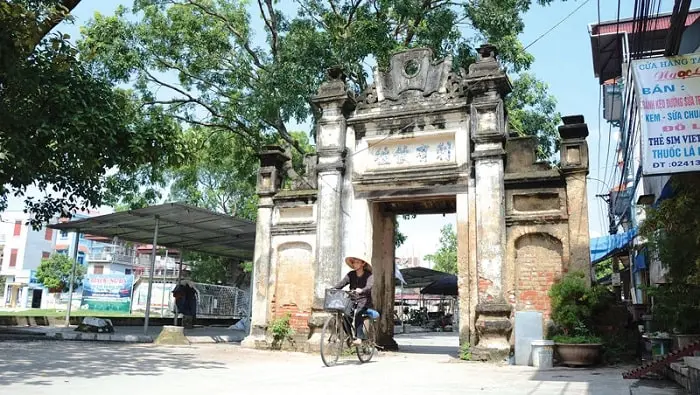
Diem village, whose name is Viem Xa , belongs to Hoa Long commune, Yen Phong district . Then, as if to remember a time when land was established to establish a village, this place was also called Viem Hamlet. About 4 kilometers from the center of Bac Ninh city, the crow flies , but Diem village is still considered remote because of traffic problems. Perhaps that is why Diem village still retains many traditional elements close to the original , which few places have.
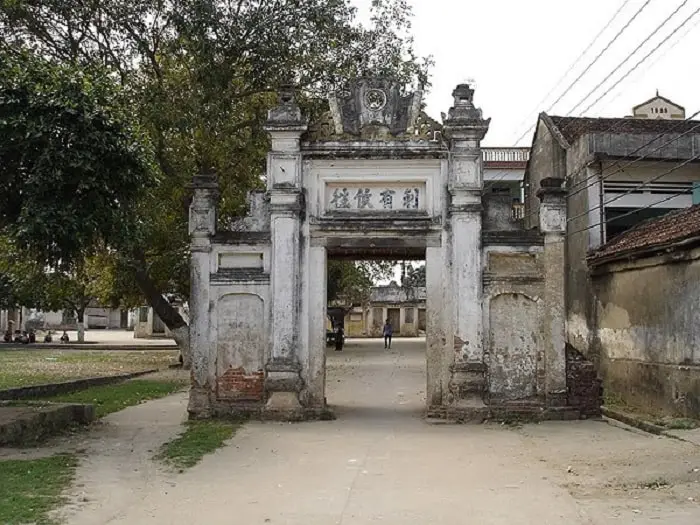
2. Ancient and traditional village of Kinh Bac culture
Diem village is located in the middle of a densely populated area of mother-worshipping villages and queens . Like Mrs. Kho in Co Me, princess Sanh, Mrs. Sanh, princess Lam in Van An, queen of the battle against Champa’s invaders is Doan Trang, the god-worshiping princess and … in Thu Ninh village, then Dong Mau in Thi Cau, Mrs. Banh in Dong Yen, Lord Choa in Chan Lac…
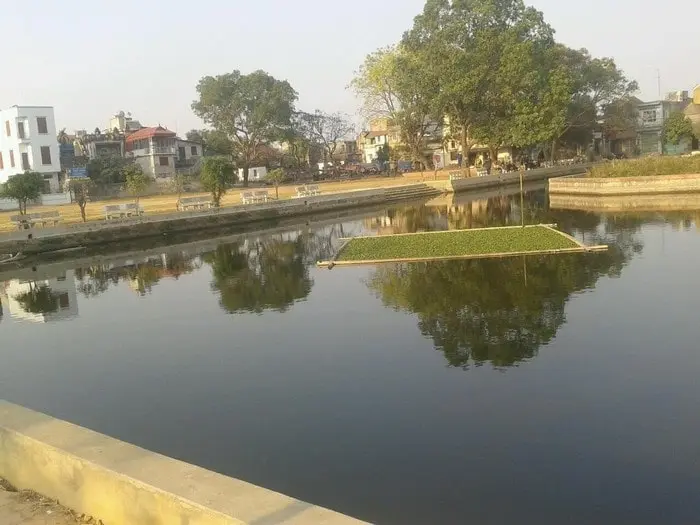
This unique factor allows the hypothesis that: The agricultural inhabitants have come here to exploit the wasteland and set up settlements for a long time. The story of the names of the land, the name of the country here further proves that. For example, the legend of the place “The same face of the mirror”. So at the latest from the 6th century, there was Diem village .
The antiquity and traditional preservation of Diem village is firstly shown that the village has a population of historical and cultural relics. First of all is the “Hung Son pagoda” pagoda. According to legend, which was built during the Ly Dynasty, the pagoda wall was built entirely of stone.

Right at the beginning of the village is the Cung temple located at the foot of Kim Linh mountain, looming in the shadow of an old tree. The temple worships two princesses Ngoc Dung and Princess Thuy Tien. Legend has it that this female body was the one who had merit in fighting the enemy to save the people and preserve the country’s brocade. The temple also has Ngoc well , which was built of stone, with clear water. The elders in the village said that since the birth of their parents, they have never seen a dry well. The villagers of Diem asserted that there were years before the ice flood, but when the water receded, the goldfish still did not go elsewhere.
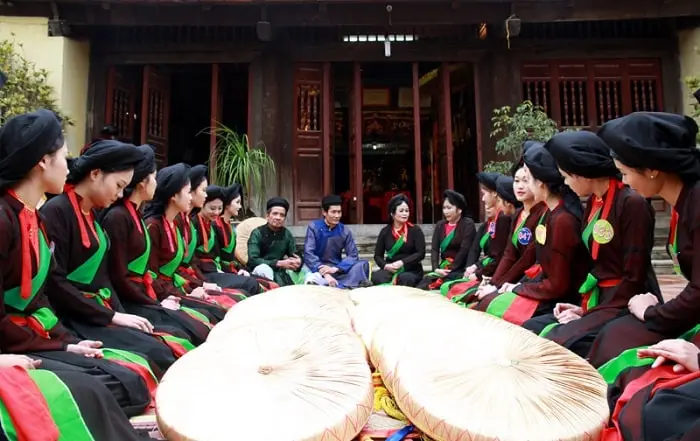
3. Dinh Diem with traditional Vietnamese architecture
Talking about the communal house of Diem, with the typical architecture of the communal house in the North, exudes a rustic soul but plays an indispensable role in the ancient Kinh Bac land.
Dinh Diem was built in June 1692 . The communal house is located majestically on a high stone foundation with a large scale. The communal house was built in the style of the Chinese characters (Chinese characters), the front of the sacrifice consisted of 5 compartments, 17.5m long and 14.9m wide. The mallet is 6.8m long and 9m wide. The art of architecture and carving stations are exquisite and splendid.
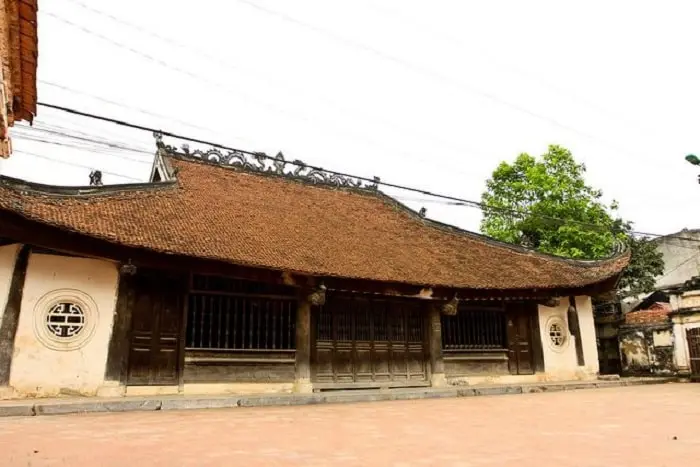
The temple worships Saints Tam Giang Truong Hong and Truong Hat . The legend clearly states that the two of them were instrumental in helping Trieu Quang Phuc defeat the Luong invaders. A few hundred years later, he became a saint to help Le Dai Hanh, then Ly Thuong Kiet fought the enemy, the song “Nam Quoc Son Ha” was made by the two of them, so it was called “divine poetry”. The characteristics of the pagoda facing the west , the communal house facing the south of this place further prove the orderly and ancient nature of Diem village .
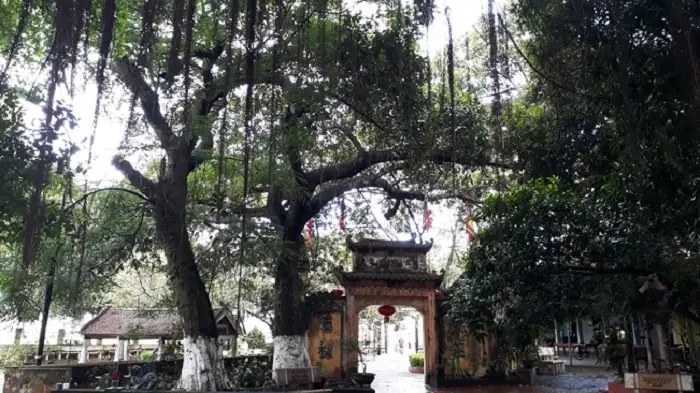
According to the tradition in the Kinh Bac region, a village can worship many tutelary gods who have had merits to protect and support the villagers. Diem has the Five Emperors (Mr. Truong Hong – Truong Hat (Saint of Tam Giang); Our Lady-King and Ancestor Quan Ho; Mr. Quan Do Thong; Mr. Giap Ngo; Mr. Ngu Vi Bao Huu), the villagers married in 1692. (the Late Le Dynasty, the 13th year of King Le Chinh Hoa) was the year the communal house was built.
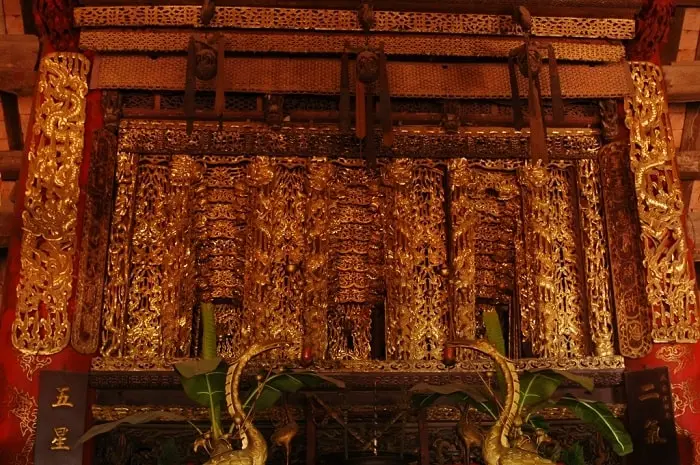
4. Temple of King Ba
In 49 Quan Ho villages, many places still have stories that prove that Quan Ho has a history in his village. However, only in Diem village there is a temple to worship the ancestors of Quan Ho , called King Ba Temple .
The temple is located in the middle of the ancient relic complex of Viem Xa village (nominal name of Diem village), folklorely known as King Ba Temple, it is said that the temple is ” The Ancestor Quan Ho ” and has long been famous for Quan festival. they .
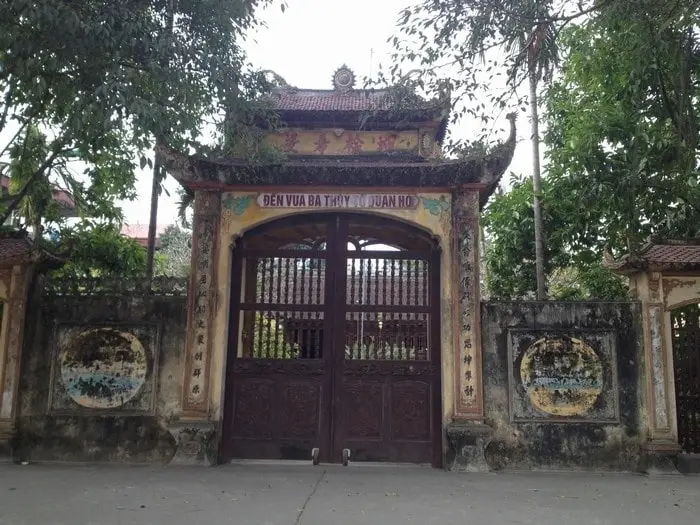
King Ba Temple was originally built a long time ago, but has been embellished many times; The oldest remaining architectural sculptural imprint is a pair of “crocodiles” on the body with clusters of lanceolate clouds in the artistic style of the Le Trung Hung period; The late architectural class belongs to the Nguyen Dynasty – On the first sentence of the former Tien Te court, there is still the original Chinese line: “Kai Dinh dynasty nine years” (1924). King Ba Temple was recognized as a cultural relic by the Ministry of Culture and Information in December 1994.
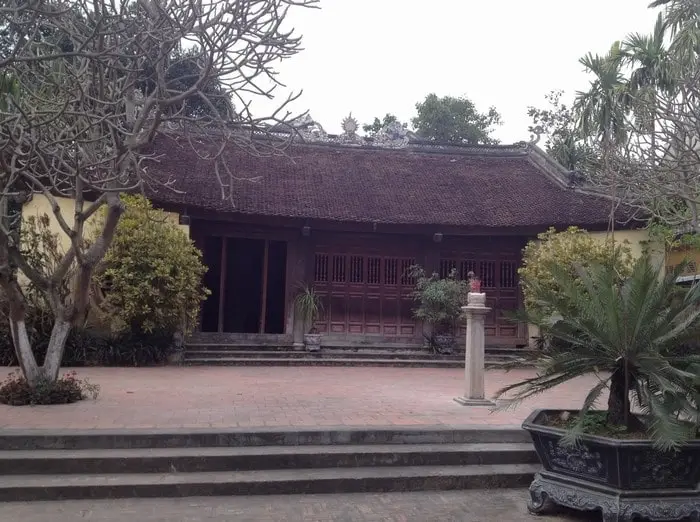
In 2000, the temple was completely rebuilt. The temple has an architectural style of the word “Vuong” including: Front sacrifice, Burning incense and harem, decorative carved wooden frame, with gracefully curved tile roofs.
King Ba Temple also preserves precious antiques such as thrones, statues, ordination, diaphragms, couplets and many other worshiping objects.
5. King Ba Temple Festival
According to the tradition of Viem Xa village, every year on February 6 ( lunar calendar ), King Ba Temple opens a festival. On the 5th, the villagers hold a ceremony to open the temple door. On the morning of the 6th of the main festival, the villagers hold a sacrifice to the god, in the ritual there is “singing” Quan Ho worshiping the gods of the “we” Quan ho in the village with polite voices praising the god’s merits and asking for help. for people to have good health and good harvests.
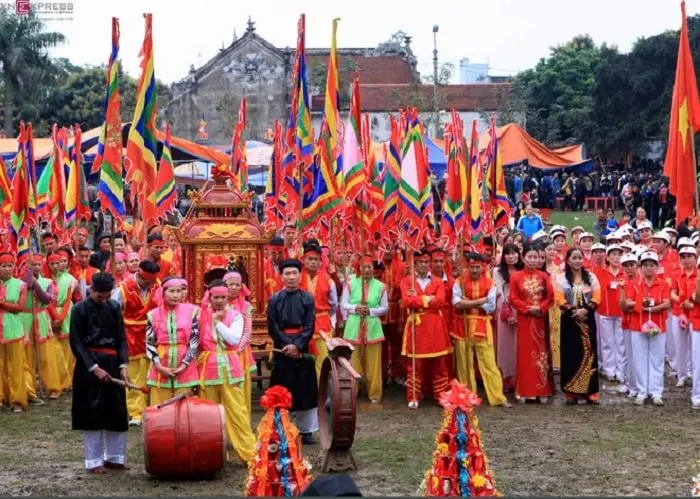
Next is the procession of King Ba’s palanquin around the village, symbolizing the day when King Ba set foot on the land of Viem Xa. After the ceremony, there is a festival with many entertainments such as wrestling, bridge robbery, Quan ho exchanges…
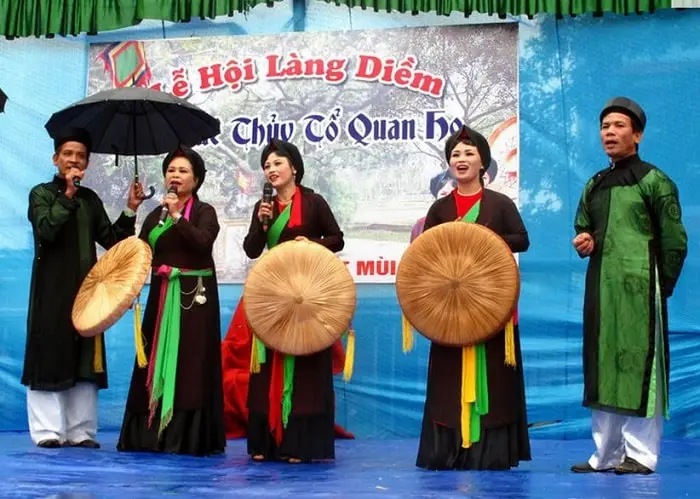
6. Only Viem Xa village still preserves the oldest living customs of Quan ho
In particular, the people of Viem Xa village still preserve the oldest customs of Quan ho living in King Ba temple such as: Whenever there is a drought, there is the custom of “singing” Quan Ho to pray for islands, when singing only “we” “The village mandarin is sung and sings only in formal (older) voices.
On the other hand, only Viem Xa village still preserves the oldest living customs of Quan ho such as: “singing” covered quan ho, brothel custom, sleeping with friends, making friends, marrying…
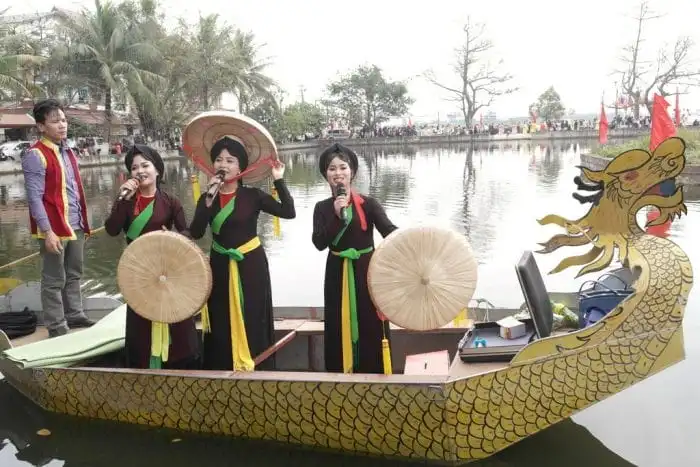
Viem Xa is a village with many generations of Lien Anh and Lien Sister, famous artisans who are knowledgeable about the customs of Quan ho and can sing the most formal voices in the region. All festivals of temples, communal houses and pagodas of the village are outstanding with Quan ho cultural activities and attract many Lien anh, Lien Quan ho from villages in the region to attend the festival.
Source: Collected internet.
Destinations near : Viem Xa Quan family village
-
Travel Tam Phu Temple Bac Ninh
Tam Phu Temple (also known as Ba King Temple), belongs to Cao Duc Commune, Gia Binh District
-
Travel Kim Thao Village Communal House
Kim Thao is a low-lying and ancient land of Bac Ninh province. Currently, the communal house is located in the center of the village, facing south.
-
Travel Le Chi Vien relic site
Le Chi Vien relic site in Dai Lai commune (Gia Binh, Bac Ninh) was started construction from the Ly dynasty
-
Travel Linh Ung Pagoda Bac Ninh
Linh Ung Pagoda (referred to as Kham pagoda) is located in Ngoc Kham village, Gia Dong commune, Thuan Thanh district, Bac Ninh province
-
Travel Luy Lau Ancient Citadel
-
Travel Tu Phap Mother Temple
The To Pagoda has the word "Phuc Nghiem Tu" in Man Xa village (Men village), Khuong Tu canton, Sieu Loai district, Thuan An district, Kinh Bac province.